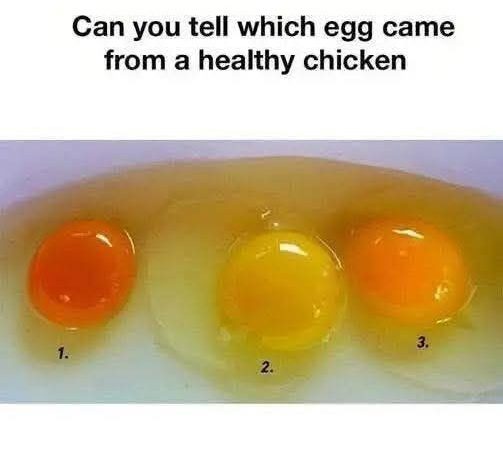How to Tell If an Egg Came from a Healthy Chicken: 6 Signs of Superior Quality

Eggs are a staple in many kitchens, and while most look similar from the outside, the quality can vary dramatically. The difference often comes down to the health, diet, and living conditions of the chicken that laid them. Eggs from well-cared-for chickens who have the freedom to forage and eat a natural diet are not only more flavorful and vibrant but are also packed with more beneficial nutrients. Knowing what to look for can help you select a truly superior egg. Here are six key signs that an egg came from a healthy, happy chicken.
ADVERTISEMENT
1. A Deep, Richly Colored Yolk
The color of an egg yolk is one of the most reliable indicators of a chicken’s diet. A deep orange or golden yolk is a clear sign that the chicken was fed a diet rich in carotenoids. These natural pigments are found in plants and insects that chickens love to forage on, such as fresh grass, marigolds, and clover. The vibrant color isn’t just for show; it indicates a higher concentration of important nutrients like vitamin A, vitamin D, and omega-3 fatty acids. In contrast, a pale yellow yolk is often from a chicken that was fed a simpler, less varied diet, such as a basic grain feed without access to pasture.
ADVERTISEMENT
2. A Thick, Gelatinous White (Albumen)
When you crack an egg from a healthy chicken, the egg white, or albumen, should be thick and gelatin-like, not watery. A high-quality egg will hold its shape when cracked into a pan, with the yolk sitting up high and the white staying tightly around it. A runny or thin white can be a sign of an older egg or a chicken that is not getting proper nutrition. The thick texture is a direct result of the protein quality, which healthy chickens produce consistently.
ADVERTISEMENT
3. A Strong and Sturdy Shell
The shell of an egg is a great reflection of the chicken’s mineral intake. A strong, firm shell that feels solid and perhaps even slightly rough to the touch is a sign that the chicken received a diet rich in calcium and other essential minerals. Chickens that are allowed to forage and have access to things like crushed oyster shells or limestone naturally produce much more durable shells. A thin, brittle, or easily cracked shell, on the other hand, often points to a chicken that is deficient in calcium or under significant stress.
4. A Clean, Pleasant Smell and Rich Flavor
A fresh, high-quality egg has a very mild and pleasant aroma when cracked open. Once cooked, it will have a richer, creamier flavor that many describe as tasting almost buttery. This superior taste comes directly from the chicken’s varied, natural diet. Lower-quality eggs, especially those from chickens raised in crowded, stressful factory farm environments, may have a much blander taste and, in some cases, a slightly “off” or sulfur-like smell. The vibrant flavor is a key sign of a well-cared-for bird.
5. Minimal Imperfections or Blood Spots
While tiny blood or meat spots are naturally occurring and completely harmless, a consistent presence of excessive blood spots or other imperfections on a farm’s eggs can be a sign of stress or poor living conditions for the flock. Healthy chickens living in low-stress environments with proper care and nutrition are less likely to lay eggs with these kinds of irregularities. Paying attention to these details can help you understand the overall well-being of the chickens.
6. Transparency and Ethical Farming Practices
One of the best ways to ensure you are getting eggs from a healthy chicken is to know how they were raised. Look for key terms on the egg carton, such as “pasture-raised,” “free-range,” or “organic.” “Pasture-raised” is widely considered the gold standard, as it means the chickens have constant access to a large outdoor pasture where they can forage and roam freely. This natural lifestyle directly results in a higher-quality egg. By seeking out these labels, you are supporting farming practices that prioritize both the health of the animal and the quality of the product.
Bonus Tip: The Importance of Buying Local
Whenever possible, consider buying your eggs from a local farmers’ market or a small, nearby farm. This allows for a direct relationship with the producer, so you can ask them about their farming methods, the chicken’s diet, and their living conditions. This level of transparency ensures you know exactly where your food is coming from and that you are supporting ethical, sustainable agriculture.
By paying close attention to these simple but powerful signs, you can make smarter choices about the food you eat and enjoy eggs that are not only more delicious and nutritious but also come from healthy, happy chickens.




